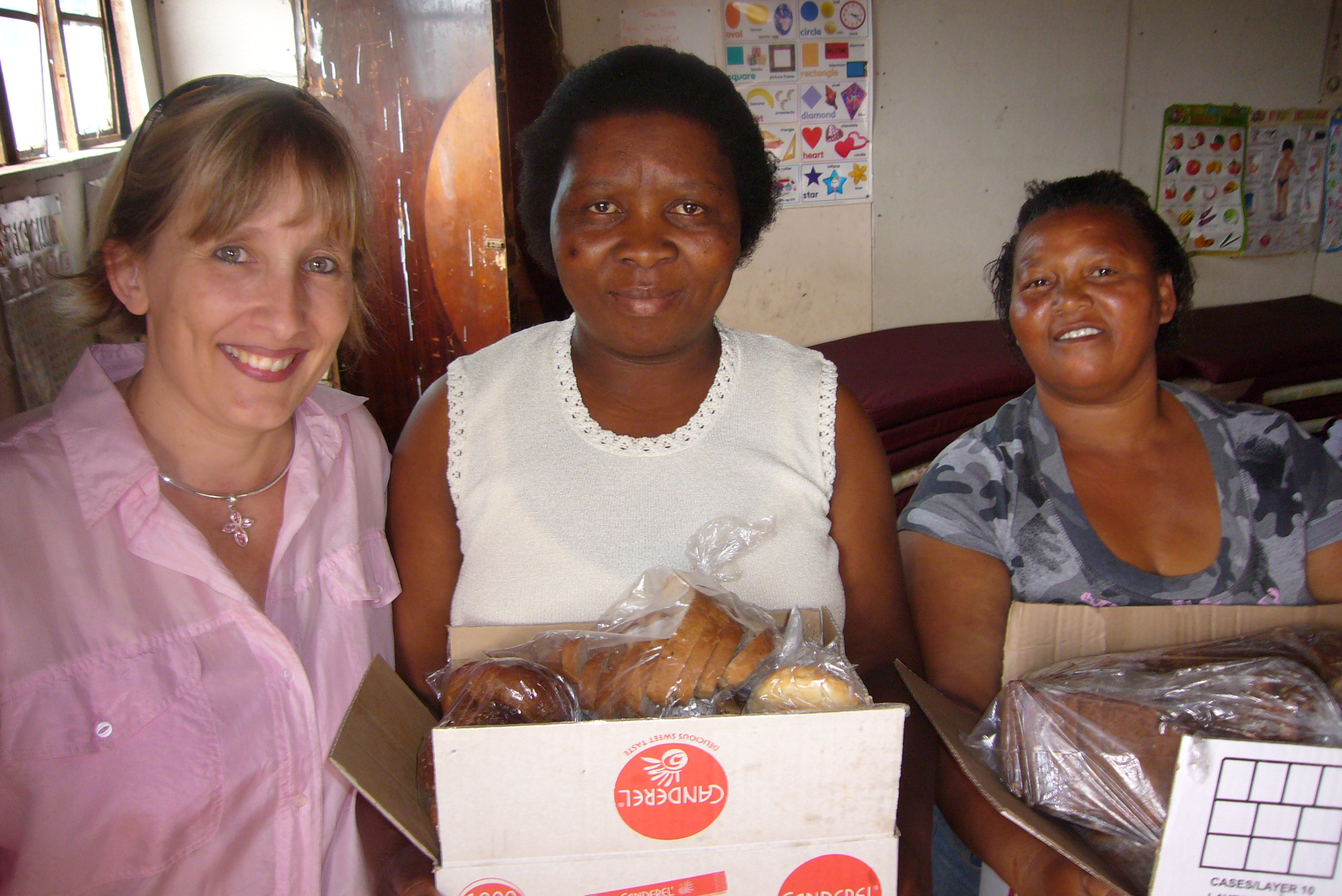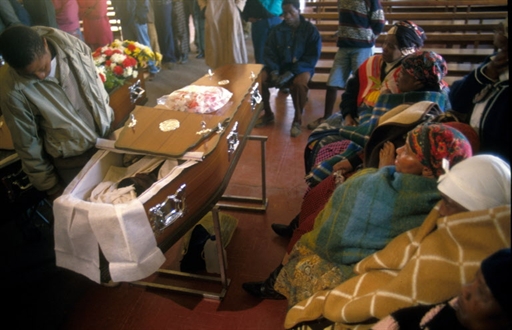Hotelier keeps her eye on the ball

Swiss-born Susanne Peterseil and her husband run a hotel in South Africa which will be home to several football teams in June’s World Cup.
However, the tough-minded fan of the beautiful game isn’t convinced that the first World Cup to be held in Africa will prove to be the blessing that many predict.
A few years ago, arguing for football to be introduced in her son’s school, she ran into a brick wall: cricket, rugby, hockey and tennis were the only sports taught at the mostly white institution, she was told.
But Peterseil didn’t give up and, doing what any good Swiss would do, started collecting signatures from other parents. The brick wall came down without too much fuss.
“Of the school’s 500 pupils, 177 came to the first training session,” she told swissinfo.ch.
“I bought 25 balls, took out a loan for the goals and shirts and got hold of two students to take care of the actual training. The school’s under-13 team is just about to join the regional league. We’re really proud of that.”
In an emergency, Peterseil herself occasionally takes charge of the training sessions.
“In South Africa parents invest much more time in school life than in Switzerland. But above all I don’t tolerate injustice. And not allowing pupils to practise a sport just because it’s not part of the school’s tradition is an injustice.”
Fifa hosts
Peterseil grew up in Winterthur, canton Zurich, and moved to South Africa when she was 25.
After her first job with a local airline in Cape Town, she worked for Coca-Cola and then for a non-governmental organisation which campaigned in the townships against Aids.
In Port Elizabeth, one of South Africa’s largest cities, she met her future husband, with whom she runs the four-star Paxton Hotel.
Fifa, world football’s governing body, was so impressed with the seafront hotel that five of the ten teams playing their group matches in the city’s Nelson Mandela Bay Stadium are staying there.
“Unfortunately the Swiss team isn’t on the list, but we’re looking forward to welcoming Germany, South Korea, the Ivory Coast, Slovenia and Chile,” said Werner Peterseil, who, although Austrian, says he’ll be supporting Switzerland “uncontrollably”.
Tourism effect
While Susanne Peterseil is clearly delighted to be able to count the Ivory Coast’s Didier Drogba and Germany’s Miroslav Klose as future guests, she nevertheless casts a somewhat critical eye over the World Cup as a whole.
“Security will be improved and the roads have been redone between the airport and the city – those are the plus points,” she said.
“But in a country where a lot of the infrastructure needs to be developed, people are asking themselves whether investing in new stadiums which will only be used for the World Cup is really worth it.”
And as for the effect on tourism for the Port Elizabeth region, too often considered just a stop-over for people travelling to Durban or Cape Town, Peterseil isn’t overly optimistic.
“A lot of people are going to be disappointed. Many have invested in B&Bs, but I doubt they’ll make a return on their investment. Tourists aren’t going to come back in large numbers after the World Cup just because they heard Port Elizabeth mentioned on the television.”
Last year, while South Africa as a whole saw a 3.6 per cent increase in visitors, Port Elizabeth was shunned. Even if the Paxton Hotel, where doubles start at 585 rand (SFr84) a night, didn’t suffer too badly, Werner Peterseil estimates guest numbers were down 40 per cent on 2008.
The city’s tourism office refuses to confirm these figures, but admits to having seen a general drop.
“Tour operators focus on Kruger National Park and Cape Town. The Port Elizabeth region is clearly under-valued. We have stunning beaches, parks where it’s easy to admire a wide range of animals and a museum which is very popular with visitors,” said Peterseil.
Inequalities
Despite this sales pitch, she is well aware that life isn’t always rosy in Port Elizabeth.
“The car industry and businesses connected with the harbour have been badly hit by the [financial] crisis. And the inequalities remain striking,” she said.
Once a week Peterseil takes leftover food from the hotel to a nursery school in the township of Walmer, one of the poorest in the city.
“Some children don’t have a thing to eat all day. For me, it’s very important to maintain this contact with what’s really happening in South Africa. Many expats have never set foot in these parts.”
According to the Swiss foreign ministry, some 9,000 Swiss live in South Africa.
Peterseil says she never feels in danger in the township. “I mean there are times when you should stay away – for example Friday evenings, when the men get drunk – but in general women, and mothers in particular, are highly respected here.”
At night, however, things are different. “Our house is the only one in the street that hasn’t been burgled. I haven’t slept well for 20 years, waking at the slightest noise. That’s the hardest thing in South Africa.”
She adds that it’s also tough not to be able to let her children play in the local playgrounds alone, as she could in Switzerland. “Everyone barricades themselves in. Neighbours don’t speak to one another.”
Freedom
Although she says returning to Switzerland wouldn’t be a problem, Peterseil really appreciates Port Elizabeth’s Mediterranean climate. What she values most however is the country’s freedom, notably concerning religion.
In South Africa, in addition to the Pentecostal, evangelical or Methodist churches on every street corner, Islam has a prominent place.
The upper floors of the Paxton Hotel offer a fantastic panoramic view of the area’s three minarets – an architectural feature that, following a recent ban on their construction in Switzerland, will no doubt be noticed by the Swiss football team, which faces Chile in the city’s sparkling new stadium on June 21.
Samuel Jaberg in Port Elizabeth, swissinfo.ch (adapted from French by Thomas Stephens)
43% of the population in South Africa lives on less than $2 a day.
The official unemployment rate is 24.5%, but in actual fact it is estimated to be at least 40%.
Last year, about 260,000 jobs were cut, affecting notably young black men with temporary employment.
13 million – out of about 48 million – people in South Africa depend on welfare payments.
The average monthly income has risen by 37.3% for black South Africans since 1995. White South Africans saw their income increase by 83.5% on average.
50% of the South African population live in conditions of a developing country, while 13% enjoy a standard of living of an industrialised country, according to the World Bank.
37% of the population have neither access to fresh water nor to electricity, one in four has no primary school education.
Life expectancy has dropped by ten years over the past decade. On average people die at the age of 50. 18% of people aged 15-49 are HIV positive.

In compliance with the JTI standards
More: SWI swissinfo.ch certified by the Journalism Trust Initiative















You can find an overview of ongoing debates with our journalists here . Please join us!
If you want to start a conversation about a topic raised in this article or want to report factual errors, email us at english@swissinfo.ch.